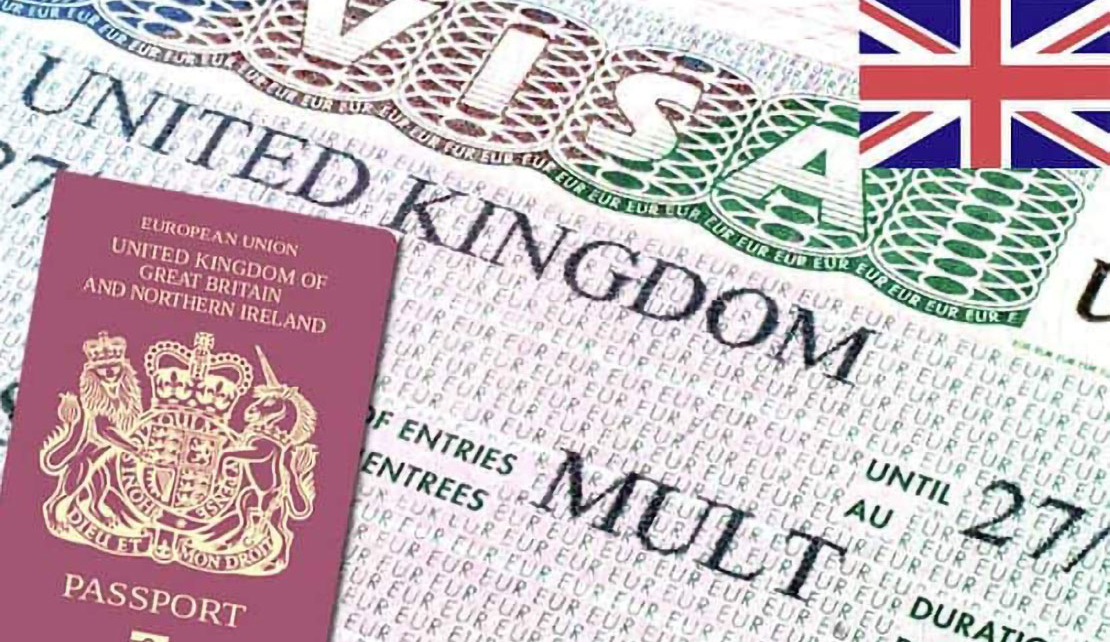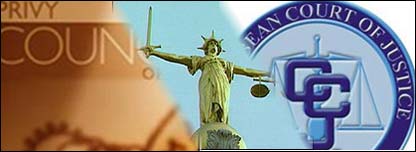JAMAICA | That UK Visa Handicap: Silence is Not an Option says AJ Nicholson

KINGSTON, November 20, 2022 - The founding fathers of the Independence Constitution could never have envisaged a situation arising in politically independent Jamaica - no one could - in which its nationals have to obtain a visa to enter the United Kingdom, the country on whose soil, according to the Constitution, their head of state and their highest court are located.
The sages would have found it even more astounding that the situation is met with unhidden indifference by the authorities.

Consequently, regardless of the station in life of any Jamaican, remaining silent on that issue could certainly not be a sustainable option for any sector of the society, public or private, uptown or downtown.
Jamaica can lay claim to notable firsts, perhaps most markedly in the field of athletics. And for its size, it surely ranks near, or at, the top for producing beauty queens, crowned, or just pleasingly moving among us. This unparalleled visa circumstance would however rank as unbeatable alongside being the only country for which a gang-leading pirate was pardoned, knighted and imposed as head of government.
Greater urgency for severing this knot from continuing to be an embarrassment to the structure of government, and to prevent further compromise of conventional practice within the system of the administration of justice has been called for following two headline policy signals of the head of Government who is also reported to have recently made the striking declaration that: "I have to start thinking about legacy. What will Jamaica be?"
Mr Holness has first to come to grips with 'what Jamaica is now'. In this, the 60th year of its political independence, he first announced to the world in the presence of the emissary of the sovereign that Jamaica intended to "move on" from the monarchy.
He then proceeded to break new ground by establishing a discrete ministry of constitutional affairs, which was interpreted far and wide as having been created for no purpose other than for activating the directive of the founding fathers for Jamaica to move forward along the road to full sovereignty.
The Prime Minister should receive strong advice from the ministry of constitutional affairs that a consequential onus lies on him to be in the vanguard of pushing for Jamaica's image to emerge from this visa imposition fairyland.
The requirement of urgent excision of this aberration does not admit of silence from any quarter; but the responsibility lies with the authorities. Who, then, comprise 'the authorities'? They clearly come from the three arms of government: the Executive, the Legislature and the Judiciary.
Concerning the Executive arm, unhelpful inferences sadly flow from the zone of silence out of which the public legal officers operate, to the extent that Jamaicans at home and in the diaspora cannot be confident that they have even engaged the government in contemplating the implications of what the visa imposition entails.
For, should it not be a top-of-the-agenda Government concern as to whether it can be positively assumed that Jamaica will receive from countries around the globe, particularly, from the British and other member states of the Commonwealth, including from sister territories within the Caribbean region, the kind of accommodation and respect reserved for independent nations?
And in the Legislative arm, the voice of the Opposition cannot be stilled. They should insist on reminding the Government that, in this transition exercise, the founding fathers have provided for Government and Opposition having co-equal responsibilities in the legislative process.
That the journey calls for give-and-take; that no side can insist on their position being pursued to the exclusion of the views of the other side. That the Prime Minister's pledge to the visiting royal cannot get off the ground without the co-operation of the Opposition.
That the noble aim of addressing the interests of the less privileged concerning access to justice cannot be ignored, and does not abide silence. And that the imperative of removing the unwelcome visa impediment from the sphere of the justice system and from being an embarrassment to our structure of government requires the immediate attention of both sides - the core of 'the authorities' - the elect of the people.
The strong negative impact of this unparalleled visa handicap touches and concerns the Judiciary arm of Government directly. The judges have made their position publicly known on the burning question of accessibility to Jamaica's final court of appeal.
 Traditionally, the views of the Jamaican Bar Association are never disregarded by the authorities. And, on the question of delinking from the monarch's court, the Association set forth their position clearly in a letter published in The Gleaner seven years ago, on October 14, 2015, titled "The CCJ as Jamaica's final appellate court".
Traditionally, the views of the Jamaican Bar Association are never disregarded by the authorities. And, on the question of delinking from the monarch's court, the Association set forth their position clearly in a letter published in The Gleaner seven years ago, on October 14, 2015, titled "The CCJ as Jamaica's final appellate court".
The strength of the reasoning put forward by the Association together with seven other entities would no doubt be readily embraced by the President of the Caribbean Court of Justice, Mr Justice Adrian Saunders, and by the former Presidents, Mr Justice Michael de la Bastide and Sir Dennis Byron, their colleague judges and the court's supporting mechanisms. The reasoning was also such a riveting testament that snippets bear some reminding here in this space:;
"3. While a comparatively young court, it comprises judges of vast legal experience not only in the region but internationally. The various judgments coming out of the CCJ are sound, well reasoned and are comparable to those issued by other final appellate courts (including the Judicial Committee of the Privy Council).
"4. Access to the Judicial Committee of the Privy Council is simply not available to the vast majority of CARICOM nationals...(M)any are left to comment that appeals to the...Privy Council are either for the 'well heeled' or for 'convicted criminals at the mercy of pro bono lawyers'.
"5. We strongly feel that subjecting the CCJ to a political referendum and the vagaries of our adversarial political system will impact on the dignity of the court, which may serve to put the court into disrepute.
"6. Finally, Our support for the CCJ is based on a considered examination of the CCJ which is well established, financed and ready to work in the interest of dispensing justice in a fair and unbiased manner for all those seeking justice before the CCJ".
Recently, former President of the Court of Appeal, Mr Justice Panton, with good reason, was moved to challenge the members of the Jamaican Bar Association that their collective voice ought not to be missing from the signature issue of unimpeded access to justice even though the Association has never resiled from their declared October 2015 position.
And, obviously, they could not, in light of the copious international commendations heaped upon the CCJ over time, buttressing the Association's own incontestable submissions.And yet, there could hardly be doubt that they would be sorely derelict in having nothing further to say on this visa requirement issue, constituted as they are as the only body of lawyers anywhere on the planet who find themselves with this odd impediment in their professional pursuit of justice in the very territory in which, as provided for in the Constitution, the highest points of Jamaica's court system and structure of government are to be found.
That intolerable unique positioning, coupled with their indispensable input in the proper functioning of the machinery of the Judiciary arm of government, contribute to the accommodation that is appropriately given to the views of the Association by the authorities in their decision-making process.
The Jamaican Bar Association therefore occupies such a position of responsibility and leadership that, fundamentally for them, silence could never be, or be seen as, a sustainable option.
This meandering journey towards full sovereignty, then, cannot be divorced from the legacy projection of the prime minister. And, Mr Holness should prudently pause to ponder that there is a clear and present danger that his legacy is on the brink of being defined by several pages depicting multiple losing excursions of government legal representatives to the constitutional court throughout his tenure.
So, in answer to his query of "what will Jamaica be?", his legacy surely cannot be left saddled with having grossly befouled the rules laid down by the founding fathers in the Independence Constitution for membership of the Upper Chamber of the Legislature by corruptly seeking to bind the conscience of wouldbe senators to thwart a positive vote on an amendment to the Constitution, no less.
Lamentably, Jamaica's legal history has had to record that a segment of the authorities in the Legislative arm of Government have dared to use its power to organize a scheme which served to concretise the visa imposition along with other longstanding impediments in the way of the exercise of access to justice.
There is an urgent need to address the cleansing of those pages, beginning with tabling of the CCJ bills in the Parliament, there being no need for the creation of any committee for the purpose. From two decades ago, the Privy Council, in a ruling sought by the Jamaican Bar Association and the Jamaica Labour Party, among others, advised as to the constitutional route to be taken.
How, then, can the expansive legal arm of this Administration remain so nonchalantly untroubled, faced as they are with the smeared pages that constitute an existential threat to representing the heart of the prime minister's legacy, when it was they themselves who had stubbornly shepherded the painful bringing into being of those pages?
And so, with the shocking obstinacy from one section of the authorities, cementing stumbling blocks in the way of Jamaica's journey towards full sovereignty, would the founding fathers not scoff at the merest hint of any suggestion of silence being an option?
AJ NICHOLSON.
